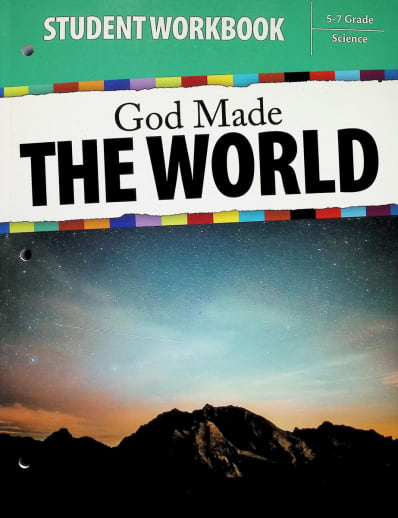The required companion to God Made the World Textbook, the Student Workbook gives students an overview of the course, a suggested schedule, and all the worksheets. The suggested pacing is two weeks per chapter, with lessons assigned 5 days per week. Worth mentioning, not all chapters will take 2 weeks, so scheduled “flex” days are included. Students may choose to use these for worship days, review days or complete projects or hands-on activities. Also included are all the student worksheets that include matching exercises, fill-in-the-blank sentences, spiritual life application and faith lessons, comprehension questions, and a selection of hands-on activities or projects for each chapter. Black and white pages are consumable, but not reproducible. Answers are included in the back. Additional supplies are needed to complete the hands-on activities. NKJV Bible.
God Made the World Student Workbook
Product Overview
- Required consumable workbook for Generations God Made the World Text
- Contains suggested schedule, student worksheets, and answers
- Five Day per week schedule with built in flex days
Description
'Oh, the depth of the riches both
of the wisdom and knowledge of God! How unsearchable are His judgments
and His ways past finding out!' (Romans 11:33)
'This most beautiful system of
the sun, planets and comets, could only proceed from the counsel and
dominion of an intelligent and powerful Being. . . .I do not know what I
may appear to the world, but to myself I seem to have been only like a
boy playing on the seashore, and diverting myself in now and then
finding a smoother pebble or a prettier shell than ordinary, whilst the
great ocean of truth lay all undiscovered before me.' (Isaac Newton)
The greatest human scientists have acknowledged the world to contain an ocean of undiscovered truth. It is the reflection of the awesome wisdom of our omniscient God and Creator! Every page of this elementary science book is meant to excite the student to wonder and praise. The wonder of God and the Word of God are expressed in every chapter. For 5th-7th grade level students, Generations introduces science from a biblical worldview into basic astronomy, chemistry, and physics in a winsome and engaging way.
God Made the World from Generations introduces middle school students to an array of topics: physics, chemistry, astronomy, and meteorology from a Biblical Worldview. There are nine chapters, with a suggested 36-week schedule, which allows students to really spend time immersed in God’s wonderous world. Scripture and praising God in prayer are integral to the course. Along with the readings, students also complete comprehension questions, scripture reading and spiritual life application questions, and hands-on activities. The course is designed for (mostly) student independence. Parents will want to be available to answer any questions that arise, or to join their children in praising our Creator. There are two printed components for the yearlong course: the God Made the World Text and the God Made the World Student Workbook. Sold separately or in a convenient Set.
| Product Format: | Paperback Book |
|---|---|
| Grades: | 5-7 |
| Brand: | Generations With Vision |
| ISBN: | 9781735071954 |
| Length in Inches: | 11 |
| Width in Inches: | 8 |
| Height in Inches: | 0.875 |
| Weight in Pounds: | 2.2 |

